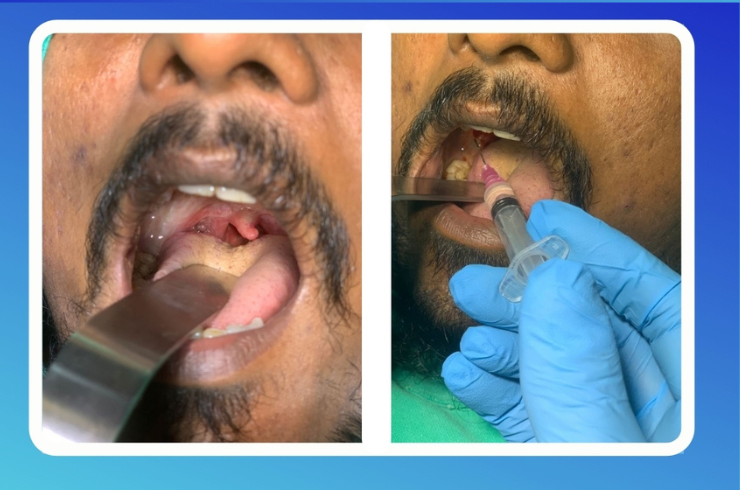Oral Submucous Fibrosis Treatment at Asian ENT Care Centre, Hyderabad
Oral Submucous Fibrosis (OSMF) is a chronic condition affecting the mouth and throat, characterized by the thickening and stiffening of the mucous membrane. It is often seen in individuals who chew betel nut, tobacco, or pan masala, and it is considered a precancerous condition. At Asian ENT Care Centre in Hyderabad, we offer comprehensive treatment for OSMF, aiming to manage symptoms, prevent further complications, and improve the quality of life for affected individuals.
What is Oral Submucous Fibrosis?
Oral Submucous Fibrosis (OSMF) is a condition where the soft tissues of the mouth, cheeks, palate, and throat become abnormally stiff, making it difficult to open the mouth and causing other oral health issues. This fibrosis is due to the excessive deposition of collagen in the submucosal tissues, leading to scar tissue formation.
Key Features of OSMF:
- Fibrosis of the oral mucosa leading to reduced mouth opening.
- White patches or leukoplakia inside the mouth, which may be precancerous.
- Burning sensation while eating spicy foods.
- Dryness of the mouth due to reduced saliva production.
- Difficulty swallowing and restricted jaw movement.
- Increased risk of oral cancer.
Causes of Oral Submucous Fibrosis
The most common cause of OSMF is the habitual chewing of betel nut (areca nut), often combined with tobacco or pan masala. Other contributing factors include:
- Chronic irritation from spicy foods, hot beverages, or poor oral hygiene.
- Genetic factors may predispose some individuals to developing OSMF.
- Vitamin deficiencies, particularly a lack of iron and vitamin B complex.
- Environmental factors, including long-term exposure to irritants.
Symptoms of Oral Submucous Fibrosis
The symptoms of OSMF vary depending on the severity of the condition. Early-stage OSMF may have no significant symptoms, while advanced stages can cause significant discomfort and difficulty in performing everyday tasks. Common symptoms include:
- Trismus (inability to open the mouth fully or pain while doing so).
- White or grayish patches inside the mouth.
- Burning sensation when consuming spicy food or hot liquids.
- Dry mouth and difficulty swallowing.
- Sore or painful spots inside the mouth.
- Reduced sensation in the oral cavity.
- Increased salivation or excessive dryness.
Treatment for Oral Submucous Fibrosis
The treatment for OSMF depends on the stage of the disease, the severity of symptoms, and whether any cancerous changes have occurred. The primary goal is to reduce symptoms, stop the progression of fibrosis, and prevent malignant transformation.
Treatment options include:
Lifestyle Modifications: The first and most crucial step is to stop the use of tobacco, betel nut, and other irritants. This is essential to halt the progression of the disease.
Medication:
- Steroids: Topical or systemic steroids may be prescribed to reduce inflammation and fibrosis in the mucous membranes.
- Antioxidants: Vitamin supplements like vitamin E, vitamin B complex, and iron are often recommended to address deficiencies that may be contributing to the condition.
- Local Anesthetics: If there’s significant pain or burning sensation, topical anesthetics can help alleviate discomfort.
Physical Therapy: Mouth exercises, sometimes known as jaw exercises, may help increase the mouth’s range of motion and reduce stiffness. This can also improve oral hygiene and reduce the feeling of a dry mouth.
Surgical Treatment:
- Incisional Biopsy: If there are concerns about the presence of cancer, a biopsy may be performed.
- Mucosal Resection: In advanced cases with significant fibrosis, surgery may be needed to remove the fibrous tissue and restore normal mouth function.
- Laser Therapy: Laser-assisted surgery may be used to remove scar tissue and reduce the symptoms of trismus (restricted mouth opening).
Speech and Swallowing Therapy: If swallowing or speaking becomes difficult, speech therapy can help improve these functions.
Preventing the Progression of Oral Submucous Fibrosis
The most effective way to prevent the progression of OSMF is to avoid the use of betel nut, tobacco, and other irritants. Early detection and treatment of the condition significantly improve the prognosis and reduce the risk of developing oral cancer.
- Regular check-ups: Routine visits to the ENT specialist for early detection of precancerous changes.
- Quitting tobacco: Stopping the use of tobacco, pan masala, and betel nut reduces the risk of further complications and progression to cancer.
- Healthy diet: Ensuring that the body gets the required vitamins and minerals can help reduce symptoms and improve healing.
Why Choose Asian ENT Care Centre for Oral Submucous Fibrosis Treatment?
- Expert ENT Specialists: Our team of experienced specialists provides comprehensive care for the diagnosis, management, and treatment of OSMF.
- Advanced Diagnostic Tools: We use state-of-the-art equipment to diagnose OSMF early and assess its severity accurately.
- Personalized Care: We offer individualized treatment plans to meet the unique needs of each patient, ensuring the best possible outcome.
- Holistic Approach: In addition to medical treatment, we provide speech therapy and rehabilitation to improve quality of life.
- Preventive Guidance: Our team educates patients about lifestyle changes and habits to prevent the recurrence and progression of OSMF.
Book a Consultation Today
If you are experiencing symptoms such as difficulty opening the mouth, burning sensations, or white patches in your mouth, it is essential to consult an expert ENT doctor for an accurate diagnosis. Early intervention can significantly reduce the risk of complications and improve your overall oral health.
